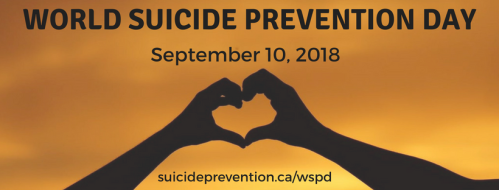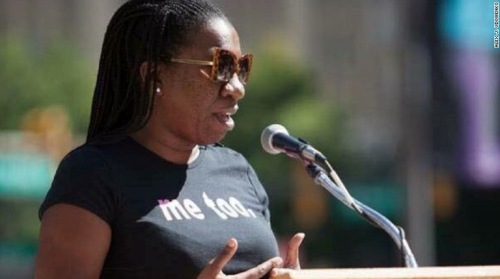
Hello to everyone who’s here from the Nova Scotia Health Authority. Thanks for taking the time to click that extra click!
(BTW – I’ve also been asked to give a short talk on Thursday over lunch. Location is now confirmed to be the VG Auditorium at the QEII. If you’re around, please come on by. It would be great to meet you all in person!)
I welcome every opportunity to break down the barriers that surround the subject of our mental health. So, when my organisation’s Workplace Health Promotion team asked if I’d write a post to be featured in this week’s internal communications as part of their Mental Illness Awareness Week campaign, it was an easy yes. (It’s just a bonus that I really like those peeps!)
Selecting a topic was also pretty simple. It’s something that always generates a lot of discussion when I talk about mental health in the workplace – Why I decided to disclose my illness.
When I went public with the fact that I live with a major depressive disorder, I was called “brave” and “strong” by a lot of people. This is giving me waaaay too much credit!
While it’s true that my current advocacy is primarily intended to benefit the greater good, the extent of positive impact that my initial disclosure on this blog would have on other people was COMPLETELY unanticipated. I certainly wasn’t burning with an altruistic desire to empower other people who lived with mental illness.
In reality, when I finally “came out” after living in the mental health closet for over 20 years, it no longer felt like a choice. My need to open up about my depression and suicidality was at such a critical point, it felt like it was my only option. It was just too f***ing hard to keep pretending to be healthy. I was spent and exhausted.
At the time, I couldn’t even conceive of how my disclosure would affect others. Honestly, I was far too worried about what impact it was going to have on me! Even though I knew I couldn’t keep living in secret shame, I was terrified I was making a huge mistake. Would I lose people’s respect at work? Would everyone be uncomfortable around me? Would anyone even want to still be friends with me?
You all know about stigma, right? Well, I was internalizing all of these negative attitudes about mental illness, whether they were actually real or just perceived. This is called self-stigma. It’s what kept me from seeking help when I desperately needed it, and why I was continuing to keep my diagnosis and need for medication a secret from everyone except my husband and sister.
I felt pathetic and weak, ashamed of what the depression had made me. My self-esteem was so low, the thought of someone knowing the “truth” about me made me want to vomit. Self-stigma took away every fibre of my confidence and strength, and when I did ultimately disclose my illness, the ABSOLUTE last thing I felt was brave.
As it turned out, much to my shock and knee-trembling relief, my big reveal was met with nothing but pure compassion and support. It’s not exaggerating to say that my disclosure saved my life.
Yes, I still live with depression. I still need to take multiple medications to feel well and I still have periods of time when things are pretty dark. Sometimes I still struggle with daily life. The difference is, I’m no longer going through it all alone. Now my friends and family know to listen if I need to talk, my supervisor allows me a flexible schedule, and my colleagues are quick to offer support if it looks like I’m getting overwhelmed.
I know this makes it sound like I’ve just shifted the burden of my illness onto others, but in reality, it’s the opposite.
Before I came out of the mental health closet, I spent most of my daily allotment of energy just trying to appear “okay”. Behind that facade, I was slowly sinking into a deep pit. Eventually, I wouldn’t even have enough energy to leave the house and my body and mind would want to shut down. Only time, and a lot of rest, could pull me out of the darkness enough for me to start into the cycle all over again.
Needless to say, I was accumulating a lot of sick time. And, when I did physically make it into work, I was inefficient and unproductive. Now, if I need to, I’m able to adjust my schedule and am comfortable asking for support. In terms of maintaining my health, this is as crucial to the balance as are my medications.
Also, my absenteeism has decreased dramatically because my workplace is now a “safe space”. I no longer feel like I have to avoid it at all costs if I’m feeling vulnerable or down. There are days that it may still take some extra effort to leave the house, but it no longer cripples me. Because I miss less work and am more effective when I’m there, my mental illness actually affects my coworkers significantly less (if at all) now that everyone knows about it.
So, if this is true, why doesn’t everyone choose to disclose? Unfortunately, it all comes back to stigma.
Even with all of the education initiatives and advocacy programs, there continues to be stereotypes, prejudice, and discrimination. Some experts feel that self-stigma is such a pervasive problem, it should be addressed as a clinical risk.
There are no patients who don’t have stigma. Stigma by itself has to be recognized as a symptom of mental disorder—not only an impact. – Amresh Shrivastava, MD (University of Western Ontario)
But here’s the ironic thing about about stigma… the only thing that has been proven to be effective at significantly reducing stigma is “contact”. This means, in order for someone to feel less negative about mental illness, they need to be aware that someone they know has it. But what person with a mental illness wants to disclose to the person that needs this important contact to feel less negative? Add to the mix the fact that WE ALL know someone with a mental illness (we just might not know that we know) and this paradox makes my brain hurt!
Mental illness indirectly affects all Canadians at some time through a family member, friend or colleague. And in any given year, 1 in 5 people in Canada will personally experience a mental health problem or illness. – Canadian Mental Health Association
I guess this brings us right back to my friends in the Workplace Health Promotion team asking to include this post in this week’s internal communications… it’s all about contact. So, thanks for coming, but before you leave and get back to work, please allow me to share one more thing.
These days I drink alcohol only very occasionally, and if I do chose to have a beer or glass of wine, it’s pretty rare for me to have more than one. Often, when socializing with people who don’t know me very well, someone will ask why I’m not drinking, or if I have had a drink, why I’ve now switched to water.
The answer to that has the potential of being a real buzz-kill, but I don’t want to lie, so I often choose to be a little flippant and say something like, “The stability of my brain chemistry is hard enough to control without adding more fuel to that fire.”
Usually, this gets a laugh and the interest ends. However, sometimes my wit isn’t enough of a deterrent and I get hit with follow-up questions. At this point, I go with this unvarnished truth, “I live with a major depressive disorder and take three different medications to keep me well. I’ve learned not to mess around too much with that delicate chemical balance.”
This is the turning point. It’s pretty much 50/50 whether the person chuckles nervously and then turns to talk to the person sitting on their other side, or whether they’ll lean in, lower their voice, and tell me how mental illness has affected someone in their life. Inevitably, before the conversation is over, they’ll comment on my courage or strength.
Do you think it’s brave if a colleague tells you they’ve had to stop putting sugar in their coffee because their blood glucose is running high? Do you commend them for openly admitting to their body’s inability to produce enough insulin? Probably not.
Perhaps, if I just keep having these conversations, there will eventually come a time when people won’t think I’m brave either… they’ll just think I’m normal.
Until then, thanks for making contact!















